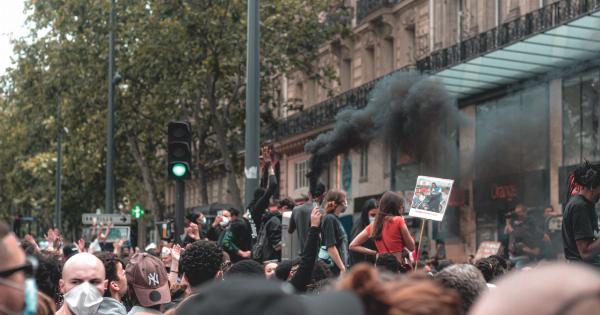In a world that seems to be facing crisis after crisis, hope can often seem like a distant memory. However, amidst all the chaos and uncertainty, there is a glimmer of optimism that shines through – the rise of a kinder, more empathetic generation.
The Changing Dynamics
Over the past few decades, society has witnessed a significant shift in values and beliefs. The previous generation’s emphasis on individual success and materialistic pursuits has given way to a more compassionate and inclusive mindset.
The younger generation today is actively seeking ways to make a positive impact on the world around them and is driven by a deep sense of empathy and social responsibility.
One of the primary factors contributing to this change is the increased awareness and exposure to diverse perspectives through the internet and social media.
Young people are now more connected than ever before, allowing them to witness and understand the struggles faced by individuals from different backgrounds. This exposure has bred empathy and a desire to address social injustices.
Redefining Success
The traditional notion of success has been redefined by this new generation.
Instead of valuing only personal achievements and financial prosperity, young people are now placing greater importance on building meaningful relationships, promoting equality, and fostering positive change.
This shift can be attributed to the realization that true fulfillment comes from creating a positive impact on society rather than pursuing individualistic goals.
The desire to leave behind a positive legacy has become a driving force for many youngsters today.
Empathy as a Foundational Pillar
Empathy acts as a foundational pillar for this kinder generation. It is through understanding and sharing the emotions of others that they find the motivation and drive to work towards a more equitable and compassionate world.
With empathy at its core, this generation is actively engaging in various philanthropic endeavors, advocating for human rights, supporting marginalized communities, and standing up against societal prejudices.
The power of empathy has paved the way for a new era of activism, with young individuals leading the charge for change.
A Digital Revolution of Empathy
The digital age has played a crucial role in accelerating the empathy revolution. Social media platforms serve as powerful tools to disseminate information, raise awareness, and mobilize communities.
It allows individuals to share their stories and experiences, fostering a collective understanding of the challenges faced by different communities.
No longer confined by geographical boundaries, young people are using social media to unite, organize protests, and demand justice.
The viral spread of powerful social movements like #BlackLivesMatter and #MeToo is a testament to the ability of social media to create a sense of solidarity and inspire action.
Education for Empathy
Recognizing the transformative power of empathy, educational institutions are incorporating empathy-building programs into their curriculum. By integrating empathy education, schools are nurturing the development of this essential skill in young minds.
These programs aim to cultivate emotional intelligence, perspective-taking, and the ability to collaborate and connect with others.
They teach young individuals to value diversity, appreciate different cultures, and actively work towards a more inclusive society. Through such initiatives, schools are empowering children to become responsible citizens, equipped with the tools to foster empathy and drive change.
A Call for Mental Health Awareness
The kinder, more empathetic generation also recognizes the importance of mental health and well-being. They understand that to effectively care for others, they must first take care of themselves.
As conversations surrounding mental health become less stigmatized, young people are actively promoting self-care practices, encouraging open discussions, and seeking help when needed.
By addressing mental health concerns and prioritizing emotional well-being, this generation is slowly dismantling the barriers that prevent individuals from seeking support.
New Challenges and Opportunities
While the rise of a kinder, more empathetic generation brings hope for a brighter future, it also comes with its own set of challenges and opportunities.
One challenge these young activists face is the immense pressure to persistently maintain their empathy and commitment to change amidst an often discouraging global climate.
It can be emotionally draining to battle against societal prejudices and deeply ingrained systems of inequality. However, it is through their resilience and determination that they find strength and continue to fight for a better world.
On the other hand, the changing attitudes towards empathy and social responsibility have also opened up new opportunities.
The future workforce will likely witness an influx of purpose-driven professionals, whose primary motivation is to make a positive impact. This shift in the mindset of young professionals has the potential to reshape industries and make businesses more socially conscious and environmentally sustainable.
The Role of Older Generations
While the younger generation is leading the charge for change, older generations also play a crucial role in nurturing and fostering empathy.
Their guidance and support are invaluable in assisting younger individuals in navigating the complexities of society and effecting meaningful change.
Older generations can share their experiences, impart wisdom, and serve as mentors to the newer generation.
By actively listening to the concerns and aspirations of the youth, and bridging the generational gap, older individuals can contribute to the development of the kinder, more empathetic generation.
A Global Movement Towards Kindness and Empathy
The rise of a kinder, more empathetic generation is not confined to a single nation or culture. It is a global movement that transcends borders, as young people from all corners of the world come together to drive positive change.
These individuals are connected by shared values of compassion, equality, and social justice, and their collective efforts are reshaping the global narrative.
By working together, respecting diverse perspectives, and fostering understanding, they are building a future that is defined by kindness, empathy, and hope.



























